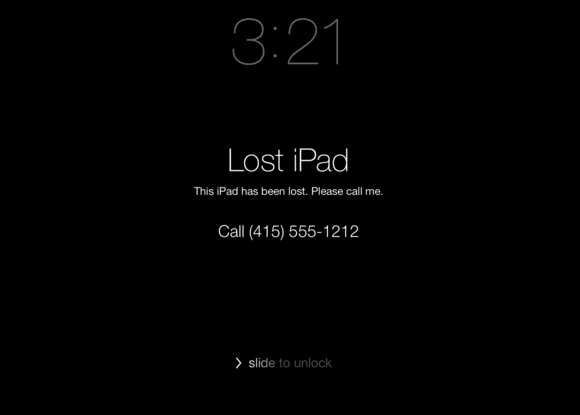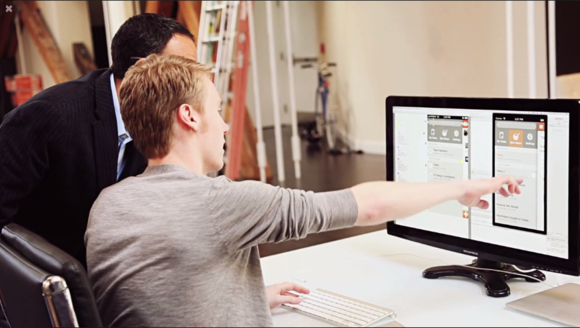Every now and again, somebody tries to tell Erik Frieberg the same story they told him six years ago—that the iPhone is made for play, and that the iOS operating system isn’t really built for business and enterprise use. Frieberg’s eyes tell him differently.
“People talk about iPhones being consumer devices, not enterprise,” said Frieberg, vice president of product marketing and end-user computing at VMware. “But every meeting I walk into, nine out of ten phones are iPhones. They’re clearly the tool of choice by far for organizations.”
If iOS originally snuck in the boardroom’s back door and adapted, then iOS 7 strolled confidently in the front door, jammed with new features to help businesses protect their data, encourage intraoffice collaboration, and communicate with customers.
“Certainly, on the enterprise front, this was one of the largest leaps forward from an operating system perspective,” said Wayne P. DeCesaris, senior vice president for managed solutions at Tangoe, which manages computing and communications networks for major companies, including PricewaterhouseCoopers, eBay, and Clear Channel.
After iOS 7 launched this fall, we spoke with a number of enterprise experts to get a better look at how the new operating system will play in the business arena. The consensus? There’s a lot to like—and some stuff that still needs to be done.
“You might even say that iOS is the most corporate-friendly OS on the market right now,” Frieberg says.
What’s working at work
CIT spoke to mobile enterprise experts around the industry and found widespread praise for the following iOS 7 features:
Device security: Who knows better than Apple that a smartphone loaded with sensitive work-related data…and then forgotten on a bar stool is a disaster waiting to happen.
“A lot of companies worry employees don’t use passwords on their phones,” said Domingo Guerra, president of Appthority, a mobile security services company. “Lost devices are probably the number one way data has been lost from these devices.”
Enterprise experts welcomed iOS 7’s new security features. Activation Lock makes stolen phones tough for thieves to crack. For instance, once you designate your device as lost, whoever is in possession of it can’t restore or reactivate it. The new iPhone 5s also offers a fingerprint-activated lock that works in conjunction with the passcode.
Whether these measures are enough remains to be seen. There have already been reports of fingerprint hacking, observers noted. “We’ll see if that can stand the test of time and the hardened enterprise approach,” Tangoe’s DeCesaris said, “but it’s certainly a step in the right direction.”
App security and management: Many iPhones still enter the workplace on a “bring your own device” basis—meaning employees own them and use them both for personal and professional use. That dual use creates opportunities for a company’s sensitive data to escape into the real world. iOS 7 includes a number of features that help IT departments manage employees’ access to corporate apps and data.
“Security is the enabler of enterprise agility,” said Troy Fulton, Tangoe’s director of product marketing. “What Apple seems to have done with iOS 7 is they’re moving security into the application, so it’s app-centric security, not just the device.”
For starters, iOS 7’s new Per App VPN feature makes it possible for specific apps used and distributed by companies to be configured to automatically connect to the company’s virtual private network (VPN) to transmit their data, while a user’s personal apps cannot.
iOS 7 also includes features that limit data to third-party apps unless a passcode has been entered and that allow IT technicians to wirelessly configure company-managed apps. According to Apple, companies will soon be able to withdraw an app license from a departing employee and redistribute it to somebody else on the team—saving money (buying one app instead of two) and making it more difficult for a disgruntled worker to carry sensitive data out the door with them.
“If your users change, you typically want the ability to get that license back and redeploy it,” said John Herrema, senior vice president of corporate strategy for Good Technology. “That wasn’t possible until now. We think that’s going to make the App Store more interesting and practical for enterprise use.”
Distributing apps has gotten easier, as well. New to iOS 7 is an Enterprise Single Sign-on feature that lets users access their company’s whole suite of apps by entering a passcode just once.
Tools for teamwork: Matt Cutler, CEO of Kibits, applauds iOS 7’s new AirDrop function, which allows nearby iPhone users to exchange files. That feature helps power his company’s app, Collaborate, which encourages team-building and information-sharing in the workplace. Right now, the feature is used mostly for sharing pictures, but Cutler believes it could end up being transformative in the workplace.
“We’re all nearby, we’re all on iPhones, and we’re all running iOS 7,” Cutler said. “It’s just another mechanism for making collaboration seamless so you and the team can get onto the task at hand.”
Widespread adoption: One thing that iOS 7 has going for it—like earlier versions of the OS—is widespread adoption of the latest version among potential users. Some of this is due to technical reasons (iOS easily updates over the air), but it means that businesses don’t generally have to deal with users spread out over many versions of the operating system. One estimate suggested that 52 percent of all iOS devices were updated to iOS 7 one week after it was released—and previous versions of iOS had adoption rates of above 90 percent.
Compare that to Android phones, where just 33 percent of users are reportedly using any version of the operating system released within the last year. Supporting only one operating system version makes life easier on an IT department, which otherwise has to watch a growing fragmentation of phones and operating systems.
“The amount of people who have updated to iOS 7 is shocking,” VMWare’s Frieberg said. “I don’t think Android is capable of that.”
That’s because it’s difficult, said Mike Golz, the chief information officer of SAP Americas. “In the iOS space, it is easier as Apple delivers an integrated device, OS, and app ecosystem to bring users to the latest level quickly and across the board.”
Free office apps: And, oh yeah, lots of experts like that the iWork suite of apps is now free for new iPhones running iOS 7—a move that “signals Apple’s move to compete with Microsoft’s free Office and appeal to the enterprise user,” said Tim Panagos, chief technical officer for Point.io, which creates collaborative enterprise apps for businesses.
What’s needed, what’s next
Despite the list of goodies provided by iOS 7, enterprise experts said they still want more. Several, for example, said battery life could be better.
“You’re not just texting. You’re using this for email, you’re using this for voice,” DeCesaris said. “In enterprise, these batteries are draining faster.”
Most of the wish-list items, however, were more abstract. Many said they’d like a return to less-fragmented days when nearly every worker in nearly every company carried a BlackBerry—for work purposes only—giving companies more control over their data and how employees communicate it.
For example, despite the arrival of Per App VPN and similar technologies, companies still worry that data might be leaked (purposefully or not) from their own apps into other apps an employee carries on a phone—a proprietary spreadsheet, for example, making its way into a worker’s personal Dropox or Google Drive account, and then out into the world from there.
“They don’t have a good conception of how to separate what’s happening in a user’s personal life and what’s happening in a user’s professional life,” Good’s Herrema said.
It would also help beleaguered IT departments, several experts said, if Apple and its rivals got together to create a single standard for enterprise uses. But nobody expects that.
Despite these shortcomings, the experts consulted by CIT seemed uniformly impressed by iOS 7.
“It’s pretty clear to me that Apple has put a considerable amount of time and effort into solving some of the challenges IT managers face while trying to balance the protection of corporate data and personal use,” said Jonathan Dale, director of marketing at Fiberlink. “This release should have IT staff lining up around the block.”





